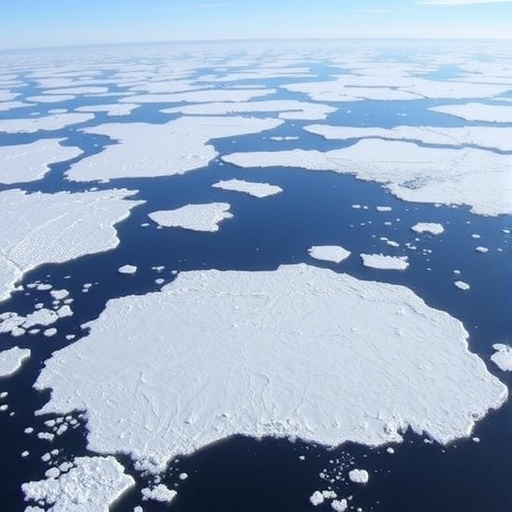Over the past decade, scientists have observed a complex interplay between climate phenomena influencing Arctic sea ice dynamics. A groundbreaking study published in the journal “Commun Earth Environ” has shed new light on the relationship between North Pacific warming and Arctic sea ice loss. The findings present a decelerating trend in the loss of Arctic sea ice, contradicting earlier assumptions about the rapid thinning and retreat of these ice masses. Researchers Yu, Bi, and Zhong have assessed changes in atmospheric patterns and ocean temperatures, linking them to significant shifts in Arctic sea ice coverage.
The Arctic region has been experiencing dramatic changes due to global warming. Traditionally, the narrative surrounding Arctic sea ice has focused on relentless melting attributed to increases in atmospheric and oceanic temperatures. However, the authors of the study reveal that a localized warming in the North Pacific has influenced atmospheric conditions over the Arctic, which in turn appears to have decelerated the rate of sea ice loss during the last decade. This represents a crucial shift in our understanding of Arctic climatology, emphasizing the need to re-evaluate our climate response models.
In the realms of oceanography and climate science, the implications of accelerated warming in the North Pacific cannot be overstated. As ocean temperatures rise, they catalyze changes in atmospheric circulation patterns. These alterations affect not only the immediate surrounding ecosystems but also have far-reaching implications for global climate systems. The current study meticulously describes how warmer currents in the North Pacific interact with the polar jet stream, influencing temperature and precipitation patterns across the Arctic.
Research methodologies employed in the study combine observational data with advanced climate models to assess correlations between North Pacific sea surface temperatures and the extent of Arctic ice coverage. Statistical analyses demonstrate a clear relationship between these phenomena, providing compelling evidence that deceleration of sea ice loss can be directly linked to warming events in the North Pacific. This dimension of analysis significantly enhances our understanding of regional climate dynamics, spotlighting the interconnected nature of oceanic and atmospheric systems on a global scale.
Furthermore, the study highlights the critical importance of long-term monitoring and research in detecting subtle shifts that can occur over short time frames. While the current findings suggest a slowdown in sea ice loss, it is imperative to remain vigilant, as fluctuating climate conditions can reverse this trend. The delicate balance of ice, ocean, and atmospheric interactions in the Arctic remains precarious, with potential tipping points that could lead to rapid changes once again.
The decelerating trend discovered by the researchers also raises questions about other climatic feedback mechanisms that may be at play. For instance, the presence of insulating sea ice helps to maintain lower ocean temperatures, which in turn can influence weather patterns further afield. If the North Pacific continues to warm at unprecedented rates, the implications for Arctic ecosystems and beyond could be transformative, impacting species migration, food webs, and indigenous communities reliant on these environments.
As the global community grapples with the realities of climate change, this study underscores the necessity for adaptive management strategies that consider nuanced shifts in Arctic conditions. Coalescing scientific insights and policy responses will be crucial in mitigating impacts, as current and future generations confront the complexities of a warming world. These findings should not only inspire a reevaluation of existing policies but also catalyze innovative thinking toward sustainable practices that consider the interconnectedness of our climate systems.
The authors caution against complacency; while the data reveals a deceleration in ice loss, the long-term trajectory remains uncertain. Climate change continues to pose severe threats to polar regions, and the volatility of natural systems implies that any positive signals may quickly dissipate. Therefore, ongoing research is essential in informing debate and decision-making as societies worldwide brace for the repercussions of climate variability.
As we delve into the future of Arctic sea ice, it is vital to consider broader influences such as greenhouse gas emissions and global warming thresholds. The Southern and Northern Hemispheres are intertwined through atmospheric currents and oceanic streams. The health of Arctic ice is thus not an isolated phenomenon, but one intricately connected to actions taken globally to combat climate change. Engaging various stakeholders, from governments to local populations, in the dialogue surrounding these findings can foster collaborative efforts toward effective climate action.
The study serves as a critical reminder that while climate science often conveys dire warnings, it also uncovers opportunities for understanding and adaptation. The unexpectedly resilient behavior of Arctic sea ice in response to specific warming events provides a glimmer of hope that not all feedback loops are irrevocable. By prioritizing integrated climate research and respecting the natural world’s complexities, society can strive for solutions that are informed, equitable, and effective.
In summary, the deceleration of Arctic sea ice loss catalyzed by accelerated North Pacific warming presents a fascinating yet cautionary tale in the face of climate change. As our understanding of these dynamic interactions deepens, the imperative to communicate these insights effectively becomes ever more pressing. Raising awareness of these interconnected phenomena can galvanize public sentiment and lead to actionable change, uniting all who share the planet in protecting our environment, people, and future.
Subject of Research: The impact of North Pacific warming on Arctic sea ice dynamics.
Article Title: Decelerated Arctic Sea ice loss triggered by accelerated North Pacific warming over the past decade.
Article References:
Yu, L., Bi, H., Zhong, S. et al. Decelerated Arctic Sea ice loss triggered by accelerated North Pacific warming over the past decade.
Commun Earth Environ 6, 922 (2025). https://doi.org/10.1038/s43247-025-02882-1
Image Credits: AI Generated
DOI: https://doi.org/10.1038/s43247-025-02882-1
Keywords: Arctic sea ice, North Pacific warming, climate change, environmental science, atmospheric circulation.




